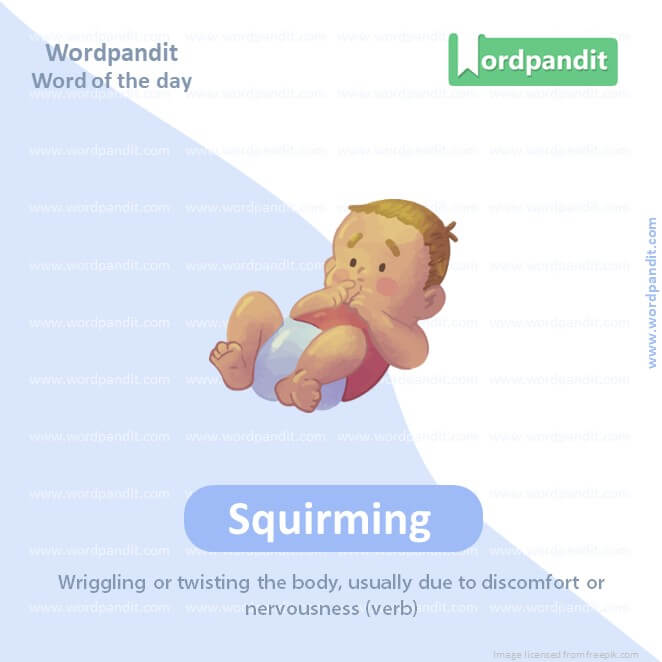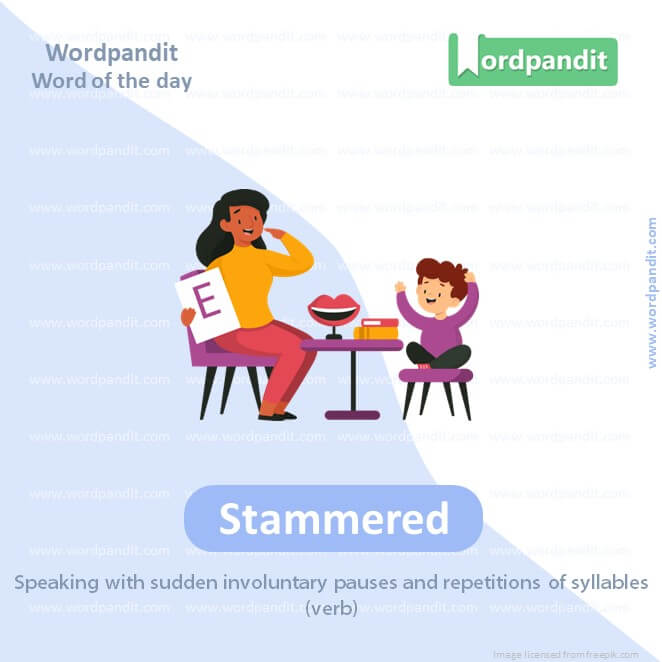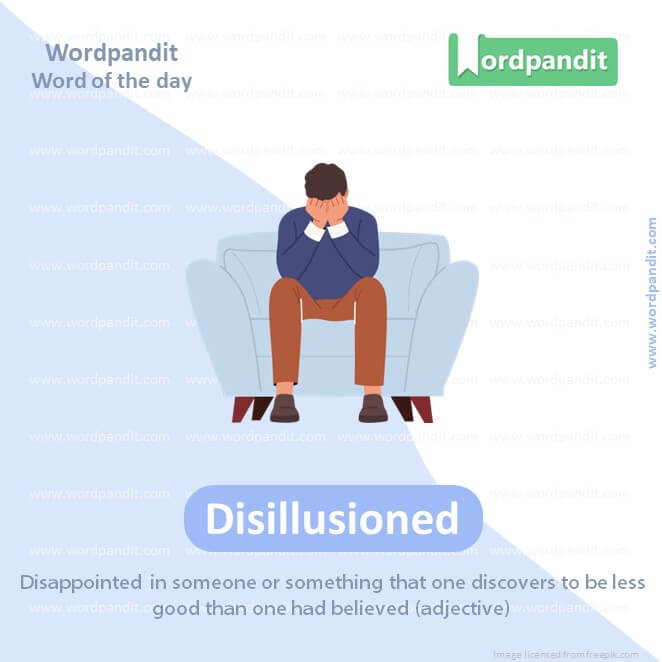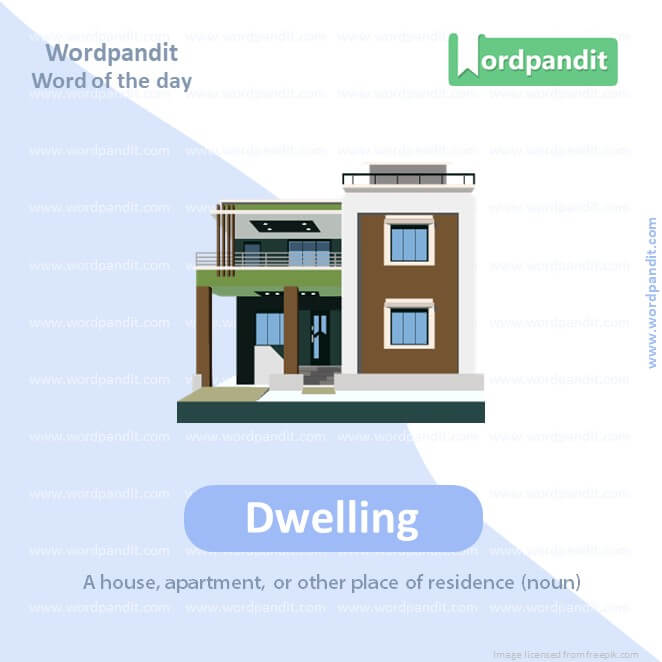Daily Vocabulary Words: List of Daily Used Words in Leading International Newspapers
Hi there. Welcome to this special section @ Wordpandit.
Our endeavour here is very simple: to highlight important daily vocabulary words, which you would come across in leading newspapers in the country. We have included the following newspapers in our selection:
• The New York Times
• The Washington Post
• Scientific American
• BBC
• The Guardian
• Psychology Today
• Wall Street Journal
• The Economist
We are putting in extensive work for developing your vocabulary. All you have got to do is be regular with this section and check out this post on a daily basis. This is your repository of words that are commonly used and essentially, we are posting a list of daily used words. Hence, this has significant practical application as it teaches you words that are used commonly in leading publications mentioned above.
Visit the website daily to learn words from leading international newspapers.

WORD-1: Squirming
CONTEXT: It was only when I attempted to make small talk with my visibly squirming seatmate on a Raleigh-Durham to New York flight that I realized it was me causing that look of horror on his face, rather than the slight turbulence we had been experiencing since takeoff.
SOURCE: New York Times
EXPLANATORY PARAGRAPH: Imagine a worm moving around on the ground, twisting and turning. That’s ‘squirming’. It means to wiggle or twist your body from side to side, usually because you’re uncomfortable or nervous.
MEANING: Wriggling or twisting the body, usually due to discomfort or nervousness (verb).
PRONUNCIATION: SKWUR-ming
SYNONYMS: Wriggling, Twisting, Fidgeting, Turning, Thrashing.
USAGE EXAMPLES:
1. The child was squirming in his seat during the long car ride.
2. She squirmed with embarrassment when her name was called.
3. The puppy was squirming with excitement.
4. He tried to hold the squirming fish in his hands.

WORD-2: Stammered
CONTEXT: I slammed the laptop shut, stammered an apology and mumbled about how these detailed crash reports were, in fact, highly comforting, and it had just slipped my mind where I was, and it hadn’t been my intention to spread worry.
SOURCE: New York Times
EXPLANATORY PARAGRAPH: Imagine trying to tell a story but you keep pausing and repeating parts of words. That’s ‘stammering’. It means speaking with sudden involuntary pauses and a tendency to repeat the initial letters of words.
MEANING: Speaking with sudden involuntary pauses and repetitions of syllables (verb).
PRONUNCIATION: STAM-erd
SYNONYMS: Stuttered, Faltered, Hesitated, Babbled, Muttered.
USAGE EXAMPLES:
1. Nervous, he stammered through his speech.
2. She stammered an apology, feeling embarrassed.
3. The child stammered his name when asked by the teacher.
4. He stammered out a response to the unexpected question.

WORD-3: lionizing
CONTEXT: the best reason to vote for Biden is to stave off the calamity of an encore Trump administration, in which a lawless would-be dictator, proclaiming his own immunity from prosecution and lionizing the violent mob that tried to keep him in power, enacts an orgy of retribution against small-d democrats.
SOURCE: New York Times
EXPLANATORY PARAGRAPH: Imagine everyone in school treating someone like they’re a superhero, always praising them and making them feel very important. That’s ‘lionizing’. It means treating someone as if they are very important or famous.
MEANING: Treating a person as a celebrity or with great importance (verb).
PRONUNCIATION: LYE-uh-nize-ing
SYNONYMS: Glorifying, Exalting, Celebrating, Idolizing, Praising.
USAGE EXAMPLES:
1. The author was lionized after the success of her book.
2. He enjoyed being lionized by his fans.
3. The media has a habit of lionizing certain public figures.
4. After his heroic act, he was lionized by the community.

WORD-4: Disillusioned
CONTEXT: But after three years in office, Biden probably won’t be able to talk Americans into feeling excited about him, and the pro-Palestinian demonstrators who interrupted him are a reminder of how disillusioned many progressives are by his Israel policy.
SOURCE: New York Times
EXPLANATORY PARAGRAPH: Imagine believing that a superhero is real, but then you find out they’re just in movies. You might feel ‘disillusioned’. It means being disappointed because you found out something is not as good as you thought it was.
MEANING: Disappointed in someone or something that one discovers to be less good than one had believed (adjective).
PRONUNCIATION: dis-ih-LOO-zhuhnd
SYNONYMS: Disenchanted, Let down, Disappointed, Disheartened, Cynical.
USAGE EXAMPLES:
1. She became disillusioned with her job.
2. After the scandal, many were disillusioned with the leader.
3. The failed promises left voters disillusioned.
4. He felt disillusioned by the realities of politics.
WORD-5: Ostensibly
CONTEXT: It was ostensibly about white supremacy, but its real theme was truth, and the way historical fictions from the Lost Cause of the Confederate South to Trump’s big lie about the 2020 election license tyranny and oppression.
SOURCE: New York Times
EXPLANATORY PARAGRAPH: Imagine your friend says they’re cleaning their room, but they’re actually playing a video game. They are ‘ostensibly’ cleaning, which means it looks like they’re doing one thing, but they’re really doing something else.
MEANING: Apparently or purportedly, but perhaps not actually (adverb).
PRONUNCIATION: os-TEN-suh-blee
SYNONYMS: Apparently, Seemingly, Supposedly, Allegedly, On the surface.
USAGE EXAMPLES:
1. The meeting was ostensibly about the budget, but it turned into a general discussion.
2. He went out, ostensibly for a walk, but actually to meet his friend.
3. The film is ostensibly a comedy, but it has serious undertones.
4. She was ostensibly the manager, but others made the decisions.

WORD-6: Dwelling
CONTEXT: Mr. Biden would refer to his predecessor as “the former guy,” and try to switch the conversation to a more promising future rather than dwelling on the past.
SOURCE: New York Times
EXPLANATORY PARAGRAPH: Think about where you live, like your house or apartment. This place is called a ‘dwelling’. It means a place where people live.
MEANING: A house, apartment, or other place of residence (noun).
PRONUNCIATION: DWEL-ing
SYNONYMS: Residence, Abode, Home, House, Habitation.
USAGE EXAMPLES:
1. Each dwelling in the village had its own garden.
2. The new policy affects all residential dwellings.
3. They were looking for a suitable dwelling to rent.
4. Ancient dwellings were discovered during the excavation.
WORD-7: Disastrous
CONTEXT: (That’s why his Covid news conferences were so disastrous for him.)
SOURCE: New York Times
EXPLANATORY PARAGRAPH: Imagine a big, messy paint spill in the middle of the classroom. That would be a ‘disastrous’ situation. It means causing a lot of damage, trouble, or harm.
MEANING: Causing great damage, harm, or failure (adjective).
PRONUNCIATION: dih-ZAS-truhs
SYNONYMS: Catastrophic, Destructive, Devastating, Harmful, Tragic.
USAGE EXAMPLES:
1. The storm had disastrous effects on the town.
2. His decision proved to be disastrous for the company.
3. The camping trip turned disastrous when it started to rain heavily.
4. The financial crisis had disastrous consequences for investors.
WORD-8: Provocations
CONTEXT: Biden has set himself the task of trying to jolt the country out of its learned helplessness in the face of Trump’s exhausting provocations.
SOURCE: New York Times
EXPLANATORY PARAGRAPH: Imagine someone keeps poking you to make you mad. They are doing ‘provocations’. It means actions or words that are meant to make someone angry or upset.
MEANING: Actions or speech that provoke or annoy others (noun).
PRONUNCIATION: proh-vuh-KAY-shuns
SYNONYMS: Incitements, Taunts, Challenges, Stimuli, Agitations.
USAGE EXAMPLES:
1. He remained calm despite the provocations.
2. The protestors faced provocations from the opposition.
3. Her remarks were seen as provocations by the other team.
4. The government warned against any further provocations in the region.
WORD-9: Aberrant
CONTEXT: The alternative is to let Trump redefine our sense of what is shocking and aberrant in American politics.
SOURCE: New York Times
EXPLANATORY PARAGRAPH: Imagine a cat that loves swimming, which is unusual for cats. This cat’s behavior is ‘aberrant’. It means something is not normal or typical.
MEANING: Deviating from the norm or usual course (adjective).
PRONUNCIATION: AB-er-unt
SYNONYMS: Unusual, Atypical, Irregular, Abnormal, Deviant.
USAGE EXAMPLES:
1. His aberrant behavior worried his friends.
2. The study focused on aberrant patterns in the data.
3. Aberrant weather patterns have become more common.
4. The detective investigated the aberrant nature of the crime.
WORD-10: Indictment
CONTEXT.: If he is right, it’s as much an indictment of America — including the American media — as of the Biden campaign.
SOURCE: New York Times
EXPLANATORY PARAGRAPH: Imagine someone did something wrong and now they have to go to court because they are accused of doing it. This accusation is called an ‘indictment’. It means officially charging someone with a crime.
MEANING: A formal charge or accusation of a serious crime (noun).
PRONUNCIATION: in-DITE-ment
SYNONYMS: Accusation, Charge, Allegation, Arraignment, Prosecution.
USAGE EXAMPLES:
1. The official faced an indictment for corruption.
2. The grand jury returned an indictment against the suspect.
3. His actions led to an indictment for fraud.
4. The indictment detailed his involvement in the crime.
Vocabulary Daily Use Words
In the architecturally diverse world of language learning, ‘vocabulary daily use words’ act as a cornerstone. We often take these words for granted, but their significance in day-to-day communications is nothing short of monumental. Mastering these ‘vocabulary daily use words’ should be more than an ancillary task on the sideline; it should take the center stage in your language learning journey.
To begin with, approach ‘vocabulary daily use words’ with the same gusto and reverence as you would an untapped treasure chest. Go beyond the conventional realm of textbooks and explore the world of contemporary literature, newspapers, and digital content. By immersing yourself in these mediums, you’re aligning your learning with real-world language usage, thereby gaining a practical understanding of ‘vocabulary daily use words.’
Memory-enhancing tools add an extra layer of effectiveness to your learning. Flashcards, for example, are a great way to make your study sessions interactive and memory-forging. Coupled with the Leitner system, which is a principle of spacing and repetition, you can ensure better recall and understanding of ‘vocabulary daily use words.’
Furthermore, leveraging mnemonic devices aids in etching the ‘vocabulary daily use words’ into your memory. Associating common words with unique and memorable narratives in your mind enhances their recall. Regular revision and using these words in routine conversations further cement your proficiency.
The potency of immersion as a language learning strategy cannot be emphasized enough. Conversing with native speakers, if possible, provides context to ‘vocabulary daily use words’ and boosts your fluency.
In conclusion, mastering the ‘vocabulary daily use words’ is an enriching journey that requires ongoing effort, continual exposure, and hands-on practice. The strategy of learning through various mediums, using memory-enhancing techniques, leveraging mnemonic devices, and immersion can help demystify these words and enhance your overall language proficiency. So, gear up and embrace the linguistic adventure of mastering the ‘vocabulary daily use words.’











